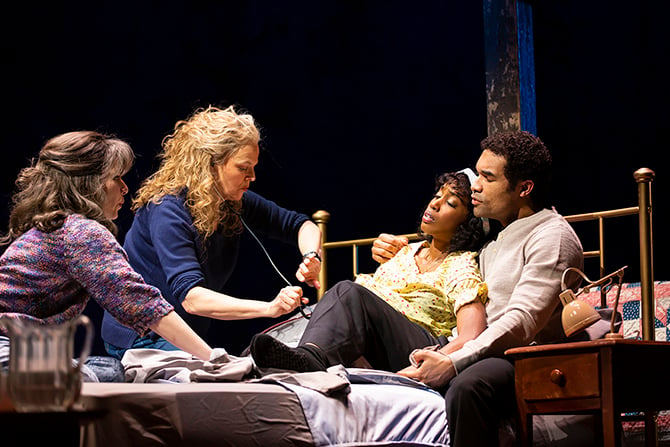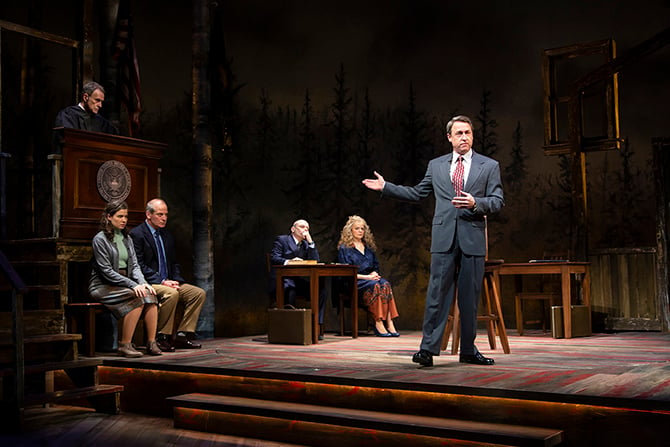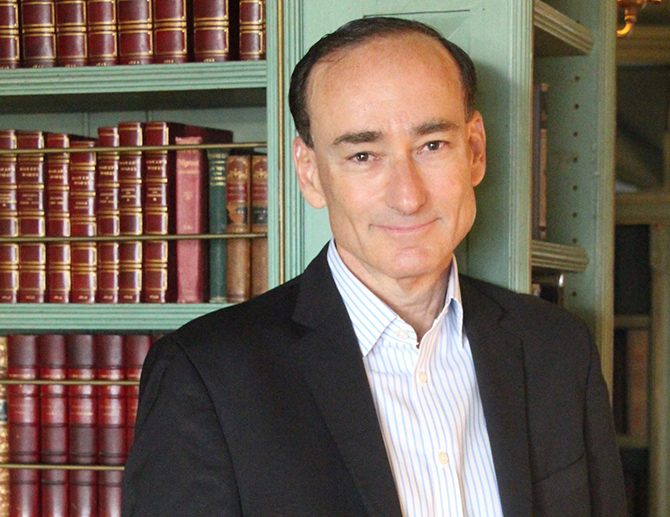The Armenian Weekly staff conducted the following interview with novelist and playwright Chris Bohjalian, whose play “Midwives” opened at George Street Playhouse in January to rave reviews.
Chris Bohjalian is the #1 New York Times bestselling author of 21 books. His work has been translated into 35 languages and three times become movies. His works have been chosen as Best Books of the Year by the Washington Post, the St. Louis Post-Dispatch, the Hartford Courant, the Milwaukee Journal-Sentinel, Publishers Weekly, Library Journal, Kirkus Reviews, Bookpage, and Salon.

Grace Experience, Ellen McLaughlin, Monique Robinson and Ryan George in MIDWIVES by Chris Bohjalian, Jan. 21 – Feb. 16 at George Street Playhouse. (Photo: T. Charles Erickson)
Armenian Weekly: Your stage adaptation of “Midwives” opened 23 years after the publication of your novel Midwives, a #1 New York Times Bestseller, which was also turned into a film (2001). Talk about Midwives’ journey from book to television film to stage.
Chris Bohjalian: Midwives was optioned for a movie in 1996, at least seven months before it was published in hardcover in 1997 and more than two years before Oprah would select it for her book club in 1998. It never would have crossed my mind to offer to write the screenplay back then. I lacked the confidence and the clout. Good Lord, I was still figuring out how to write novels. And, in hindsight, it’s a good thing I didn’t try. The movie stars Sissy Spacek, Alison Pill and Peter Coyote: they deserve (and got) a far better screenplay than I could have written back then.
Read also
But in the last decade, I have watched a lot of plays, because my daughter, Grace Experience, is an immensely gifted young actor. (She was cast as Anne Austin, the midwife’s apprentice, in the new play.) And I have fallen in love with streaming television and cable dramas. Both have had a dramatic effect on how I write novels.
And so I began writing stage plays. So far I have had two produced, and I have had the privilege of seeing them directed by Alexander Dinelaris and David Saint. The two directors have been my professors for my masters in playwriting. I have learned so much from that pair.
Working with David on Midwives has been a great gift. He has not simply taught me so much about what propels a play forward, but he has also taught me how to kill my literary darlings. His instincts are brilliant when it comes to cutting a scene or shortening a scene, or suggesting how to improve the pacing of the narrative arc.
Now, the play IS different from the novel. The novel is principally a mother-daughter love story; the play is about four remarkable women and one cataclysmic night. Unlike the novel, in the play you are in the bedroom during that labor. You are there, and I hope you feel it.
A.W.: Tell us about some of your memorable moments at George Street Playhouse in the weeks of rehearsals and rewrites leading up to opening night?
C.B.: Creating an original play is an immensely collaborative experience, and I had a fantastic director, nine spectacular actors and an astonishing design team. The crew is inspiring.
Each actor had at least one mesmerizingly perfect suggestion for a line of their dialogue — and sometimes more than one. Among my favorites? If you see the play, when Connie Danforth says, “I’ve missed you,” those three words were courtesy of Ellen McLaughlin, who plays Sibyl. They destroy me. And the scene that currently ends the play was originally the penultimate scene. It was David Saint who told me that it was a much better ending moment — and you always have to strive to end on your best.
A.W.: What has been the reaction from the viewers—those who had read the novel and those who hadn’t?
C.B.: I’ve been thrilled. When my books work, and heaven knows they don’t always, they are about heartbreak and dread. Those are the two points in a compass that drive my fiction. In the case of the MIDWIVES play, I hope that act one is dread and act two is heartbreak. Through the first two weeks, that’s what I believe audiences have felt. At least I hope so.
A.W.: One of the epigraphs in the novel Midwives is James Martineau’s quote, “We are each of us responsible for the evil we may have prevented.” Timeless, of course, but it sure has a particular resonance in this day and age. Did that factor in your decision to incorporate it into the play as well?
C.B.: Great question. Yes, absolutely. But, that point noted, I hope the characters’ behavior in regard to that quote suggests a moral ambiguity: I want people discussing the ending when they are in their cars or on the train after the play, and debating what some of the characters do.
A.W.:“Midwives” is playing at George Street Playhouse. Your most recent novel The Flight Attendant is being made into an HBO Max series starring Kaley Cuoco, and you have a new novel coming out in March. How do you adjust your writing process when other projects and book tours are vying for your attention?
C.B.: First of all, I have literally zero writing involvement with the The Flight Attendant TV series. The team that is making that series is utterly brilliant and everyone knows exactly what they’re doing. I have LOVED everything they have shared with me. Kaley Cuoco, the godmother of the project, is not merely a great actor — when I watched her on set, she broke my heart — but she is so bloody smart. She has assembled the perfect behind-the-camera team, including Steve Yockey, Suzanne McCormack, Greg Berlanti, Sarah Schechter, Susanna Fogel and so many others.
Now, I do have other TV series that are not as far along that I am co-writing. And, yes, I have a novel I am working on for 2021 and another for 2022. And, yes, I do have The Red Lotus blooming on March 17. So, I do a lot compartmentalizing. And I never work on more than one project on any day.

Michael Cullen, Molly Carden, John Bolger, Lee Sellars, Ellen McLaughlin, and Armand Schultz in MIDWIVES by Chris Bohjalian, Jan. 21 – Feb. 16 at George Street Playhouse. (Photo: T. Charles Erickson)
A.W.: What’s next for Chris Bohjalian the novelist? The playwright?
C.B.: I’ll focus on the novelist. I have The Red Lotus next month. The Red Lotus is the story of Alexis Remnick, an ER doctor in New York City, who goes on a bike tour in Vietnam with her boyfriend – a son and a nephew of two veterans of the war—who soon disappears. In his absence, she discovers that much of what he told her was a lie – and she may been in far more danger than she imagined.
I love what Publishers Weekly said about the novel. They called it, “[An] intricately plotted thriller… a diabolical plot reminiscent of Robin Cook,” which is certainly part of what I was after.
But I am also pleased that while Booklist called it “hair-raising,” that critic also understood Alexis’ emotional journey, calling the novel, “a cerebral and dramatic dive into what happens when love turns to agony.”
Yes, The Red Lotus is a thriller.
But here it is again, heartbreak and dread: when love turns to agony.



























































